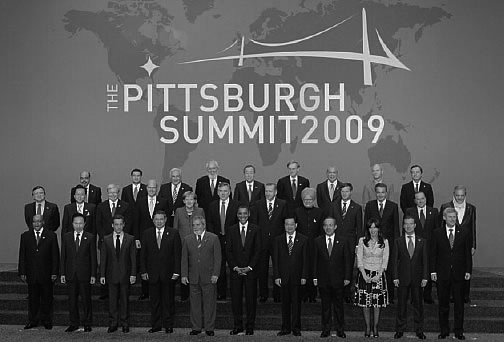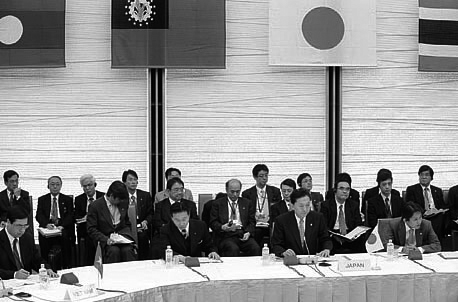Japan's Official Development Assistance White Paper 2009
Chapter 1 Response to the Global Financial and Economic Crisis
Since September 2008, the world has been faced with a financial and economic crisis rooted in the subprime loan problem of the United States (US). The crisis worked its way through the globalized financial markets and brought on a credit crunch across the world. Furthermore, the crisis is having a profound impact on the real economies of countries in the form of trade stagnation, declines in consumption, and declines in employment. The impact on the vulnerable populations in developing countries is particularly severe, and it has been pointed out that the efforts made to date towards the achievement of the MDGs may come to naught.
In Asia, the crisis had a relatively modest direct impact on the financial sector, helped by the economic structural reforms that were implemented in each country after the 1997 currency crisis and the accumulation of abundant foreign reserves in those countries, as well as advancements in regional cooperation in the financial sector, including the Chiang Mai Initiative. Nevertheless, the crisis is having a large impact on the real economy. Asian countries, which are highly dependent on exports in general, are experiencing a decline in exports, falling stock prices, and reduction in GDP growth rates due to the downturn in the global economy. Furthermore, as a result of the crisis, Africa is seeing a deterioration of its national finances, a reduction in the inflow of private capital, including foreign direct investment, and a decline in remittances from migrant workers who are working overseas. This situation has raised serious concerns that these impacts will lead to a slowdown in economic growth or delays in the achievement of the MDGs.
In this context, Japan believes that in order for the global economy to recover, it is important that developed countries take every possible financial and fiscal measure in cooperation with developing countries, as well as further strengthen their development efforts to promote the sustainable development of developing countries through the use of ODA.
With regard to the response to the global financial and economic crisis, at the Washington Summit which was held in November 2008, Japan, ahead of the other countries, expressed that it is ready to lend the International Monetary Fund (IMF) up to US$100 billion, and in February 2009 Japan signed a lending agreement with the Fund. At the London Summit (Note 2) in April 2009, the leaders of developed countries and emerging economies gathered and confirmed the need to make a concerted effort to confront the global economic crisis and take every possible measure, beginning with economic stimulus measures. On development, the leaders agreed to continue their efforts for the achievement of the MDGs and the implementation of their ODA commitments. At the same Summit, the leaders expressed support on the proposal of increasing the capital base of Asian Development Bank (ADB) by 200%. And at the end of the month, it was agreed to triple its capital base from approximately US$55 billion to US$165 billion at the meeting of the Board of Governors of all ADB member countries, which ensured financial resources for ADB to respond to the impact of the global economic crisis and long-term development needs in Asia and the Pacific region.
At the G8 Development Ministers' Meeting held in Rome in June 2009, the ministers discussed priority items for development assistance to respond to the impact of the financial and economic crisis. The G8 countries shared the view that in light of the serious impact the economic crisis is having on low income and poor countries, it is necessary for the G8 and other countries to address the crisis in a coordinated manner, and that even in the midst of this crisis it is important for the G8 countries to steadily implement their existing commitments on ODA and take steps to achieve food security.
At the G8 Summit Meeting of the 35th Leaders' Summit (G8 L'Aquila Summit) held in Italy in July 2009, the leaders expressed their recognition that in view of the impact of the current financial and economic crisis, the G8 countries have an increasing responsibility to respond, and it is important for the countries to continue to take leadership in development. In addition, at the expanded meeting with the leaders of African countries (Note 3), the leaders discussed the impact of the financial and economic crisis on Africa and shared understanding of the importance of the G8 countries' steady implementation of previous commitments on ODA and the need to enhance assistance to Africa. Furthermore, at the working session on food security, the leaders made the commitments towards a goal of mobilizing US$20 billion over three years for food insecurity in developing countries, which is becoming even more serious because of the global financial and economic crisis. Japan announced its readiness to provide at least US$3 billion in assistance for the agricultural sector including related infrastructure over the three years from 2010 to 2012.
At the G20 Pittsburgh Summit held in the US in September 2009, the G20 countries reaffirmed their historic commitment to meet the MDGs and their respective ODA pledges, with a view to enhancing their assistance to the most vulnerable populations. Furthermore, the G20 countries promised to cooperate to improve access to food, fuel, and financing among the poor.
While promptness is required to respond to the impact of the current financial and economic crisis, the international community cannot, even in the midst of such circumstances, put off efforts to find a solution to development challenges, e.g., poverty reduction in developing countries and the achievement of the MDGs. It is particularly important for developed countries to steadily implement their existing ODA commitments. Japan will steadily and promptly implement the pledges it made internationally on ODA, including assistance measures for Asia which will be discussed in the next section, and assistance to Africa, which Japan announced in the process of the Tokyo International Conference on African Development (TICAD).
Notes:
(2) Participating countries and international organizations were as follows: G7 (Japan, United States, United Kingdom, Germany, France, Italy, Canada), Argentina, Australia, Brazil, China, India, Indonesia, Mexico, Republic of Korea, Russia, Saudi Arabia, South Africa, Turkey, Thailand (ASEAN Chair), Ethiopia (NEPAD Steering Committee Chair), Czech Republic (EU Chair), European Union (European Commission, Austria, Spain), Association of Southeast Asian Nations (ASEAN) Secretary-General, African Union Commission (AUC) Chair, United Nations (UN), International Monetary Fund (IMF), World Bank, Financial Stability Forum (FSF)
(3) G8, Angola, Algeria, Egypt, Ethiopia (NEPAD Steering Committee Chair), Nigeria, Senegal, South Africa, Libya (AU Chair), AUC Chair, and international organizations participated.

G20 Pittsburgh Summit (Photo: Jiji Press)
Section 1 Enhancing Assistance for the Growth of Asia
The continuation of Asia's stable and robust growth is critical to the future growth of Japan. It is also essential to the realization of the East Asian Community proposed by Prime Minister Hatoyama. To this end, it is imperative that Japan make contribution in finance, human resources, technical assistance, and knowledge fronts to improve the intraregional flow of people, goods, and capital, and mitigate and eliminate bottlenecks to growth.
Japan has eagerly taken steps to assist Asia in addressing the impact of the financial and economic crisis. At the Annual Meeting of the World Economic Forum in Davos in January 2009, then Prime Minister Taro Aso expressed that it was important for Asia, which holds the greatest growth potential in the world, to contribute to the world economy as a center of growth open to the world. In this context, with a view to enabling Asian countries to take a coordinated and prompt response to the impact of the crisis, as well as to promote strengthening of Asia's growth potential and expansion of domestic demand, then Prime Minister Aso announced its readiness to provide ODA no less than 1.5 trillion yen in total (equivalent to US$17 billion).
However, the financial crisis continued and the world economy further declined. In order to play an active role in assisting Asia, Japan announced at the G20 London Summit in April 2009 that it would expand its commitment to Asia that was announced at the World Economic Forum, and declared that it was ready to extend ODA of up to 2 trillion yen (equivalent to US$20 billion). With regard to other public funding, Japan announced that it would facilitate trade financing by providing a total of US$22 billion of additional assistance for the next two years through the Nippon Export and Investment Insurance (NEXI) and the Japan Bank for International Cooperation (JBIC), other than the US$90 billion on average of annual support to trade finance. Japan also announced that it would support investments in developing countries to environmental areas, mainly in Asia, which was to be US$5 billion for the next two years through JBIC.
In April 2009, Japan announced "the Growth Initiative towards Doubling the Size of Asia's Economy," which gives a more concrete idea of the commitment announced at the G20 London Summit. Specifically, as a part of ODA of up to 2 trillion yen (equivalent to US$20 billion) Japan mentioned Emergency Budget Support ODA Loans totaling up to 300 billion yen to be extended flexibly in order to help boost domestic demand in Asian countries. Japan also mentioned to the support to the development of safety nets in the sectors and people vulnerable to crisis, as well as to the support to infrastructure development, development of a low-carbon emission society, and the promotion of human resources development and people-to-people exchanges.
Based on the above commitment, in June 2009, Japan extended to the Philippines an ODA loan of around 45 billion yen to support the country's agriculture and logistics infrastructure, and an ODA loan of around 2.9 billion yen to Mongolia to support the country's social sector.
In November 2009, the first Summit Meeting was held between Japan and five Mekong region countries. Prime Minister Hatoyama addressed that the Mekong region was a significant region that held the key in the open and transparent East Asian Community initiative in terms of redressing intraregional gaps. At the Summit Meeting, the leaders shared the view that the countries will establish a partnership for a future of common prosperity based on the three pillars of: comprehensive development of the Mekong region; the environment and climate change (addressing "A Decade toward the Green Mekong" initiative) and issues of overcoming vulnerability, and expansion of cooperation and exchange. In order to further advance these endeavours, Japan regards the Mekong region as a priority area and continue the policy to expand ODA to the Mekong region as a whole as well as to Cambodia, Laos, and Viet Nam (the CLV countries) respectively. Japan committed to extend ODA of more than 500 billion yen in the next three years for the Mekong region to flourish further. Also, on the occasion of the Japan-Viet Nam summit meeting, Japan decided to extend Emergency Budget Support ODA Loans of around 48 billion yen to Viet Nam.
Japan will continue its utmost efforts to expedite implementation of assistance, responding to the requests of the Asian countries.


Mekong-Japan Summit Meeting (Photo: Jiji Press)
